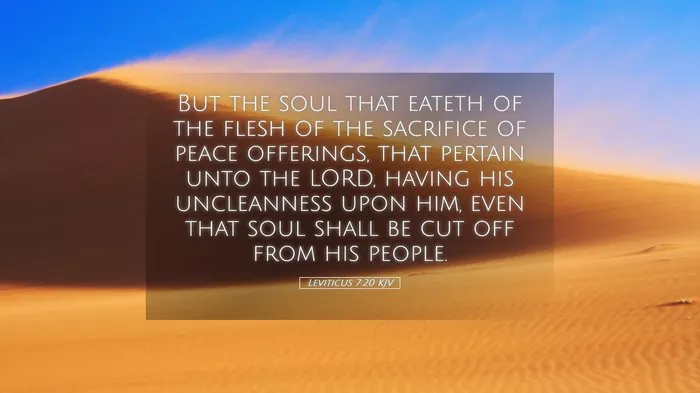Read the Daily Bible Verse – Leviticus 7:20 To Strengthen Your Spiritual Journey.
The Context of Leviticus 7:20 KJV
Leviticus is the third book of the Bible and contains laws given by God to Moses for the Israelites. It emphasizes holiness and how the people were to worship God through offerings and sacrifices.
Chapter 7 of Leviticus focuses on the regulations for peace offerings, which were voluntary sacrifices expressing thanksgiving, fulfilling vows, or seeking fellowship with God. This chapter highlights how these sacrifices should be handled to maintain holiness and reverence.
The specific context of Leviticus 7:20 is about maintaining purity and avoiding uncleanness when participating in offerings. It stresses that those who are ceremonially unclean should not eat the flesh of the sacrificial offering, as doing so would be an act of disrespect toward God and could lead to punishment.
Leviticus 7:20 (KJV)
“But the soul that eateth of the flesh of the sacrifice of peace offerings, that pertain unto the Lord, having his uncleanness upon him, even that soul shall be cut off from his people.”
This verse addresses the importance of being ceremonially clean before partaking in sacred rituals. It warns that consuming the meat of the peace offering while unclean would result in being “cut off” from the community, symbolizing separation from God and His people.
Leviticus 7:20 Meaning
1. The Requirement for Purity
The verse highlights God’s demand for holiness and purity when approaching Him. In ancient Israel, ceremonial cleanliness was vital for participating in acts of worship. Those who were unclean were temporarily barred from engaging in worship activities until they were purified.
Eating the meat of the peace offering while in an unclean state showed a lack of reverence for God’s holiness. This command was designed to teach the Israelites to respect God’s presence and approach Him with sincerity and purity.
2. What Does Being ‘Cut Off’ Mean?
The phrase “cut off” implies serious consequences. It could mean exclusion from the community, loss of fellowship, or even death in extreme cases. This punishment underscored the gravity of violating God’s commands and treating holy things casually.
The law reflected God’s desire to preserve the sanctity of worship and protect the community from defilement. By enforcing strict rules, the Israelites were reminded of the importance of maintaining purity and obedience to God.
3. Spiritual Symbolism of Cleanliness
Cleanliness in the Old Testament often symbolizes moral and spiritual purity. While the physical cleanliness laws applied directly to the Israelites, their deeper meaning pointed to the need for a pure heart before God.
This teaching foreshadowed the New Testament’s emphasis on spiritual cleanliness through repentance, forgiveness, and faith in Jesus Christ. Just as Israelites needed cleansing before approaching God, Christians are called to examine their hearts and confess their sins to maintain fellowship with God.
4. God’s Holiness and Our Response
Leviticus 7:20 serves as a reminder of God’s holiness and the reverence required when coming into His presence. It teaches that worshiping God should never be taken lightly. Instead, it requires preparation, purity, and a sincere heart.
Leviticus 7:20 Application in Life
1. Approaching God with Reverence
This verse teaches believers to approach God with respect and reverence. While Christians no longer follow Old Testament ceremonial laws, the principle of preparing ourselves spiritually still applies.
We are called to confess our sins, seek forgiveness, and purify our hearts before coming to God in prayer, worship, or communion. Approaching God with reverence demonstrates our love and respect for Him.
2. Avoiding Spiritual Complacency
Just as the Israelites were warned against carelessness, Christians must guard against spiritual complacency. Casual or insincere worship dishonors God. Believers should continually examine their hearts and motives to ensure they approach God with humility and devotion.
Practical steps include:
- Spending time in prayer and Bible study.
- Confessing sins regularly.
- Seeking accountability within the church community.
3. Understanding the Need for Holiness
Holiness remains central to the Christian life. The Apostle Peter echoes this in 1 Peter 1:15-16, saying, “Be ye holy; for I am holy.”
Holiness involves living in obedience to God, separating ourselves from sinful behaviors, and striving to reflect Christ’s character. Leviticus 7:20 reminds us that holiness is not optional—it is essential for maintaining a relationship with God.
4. Recognizing the Role of Christ’s Sacrifice
The peace offering in Leviticus foreshadows the ultimate sacrifice of Jesus Christ. Through His death, we have been made spiritually clean and reconciled to God.
However, this gift does not remove our responsibility to pursue holiness. While Christ’s blood cleanses us, we are still called to live lives that honor God and reflect His righteousness.
5. Respecting Sacred Practices
This verse highlights the need to treat sacred practices with care. For Christians, this includes observing the Lord’s Supper (Communion) with a clean heart.
Paul warns in 1 Corinthians 11:27-29 that partaking in Communion unworthily can lead to judgment. This echoes the warning in Leviticus 7:20, emphasizing the importance of examining ourselves before participating in holy rituals.
Practical applications include:
- Preparing our hearts before Communion.
- Repenting of any known sin.
- Approaching sacred practices with gratitude and humility.
Conclusion
Leviticus 7:20 is a powerful reminder of the importance of purity, reverence, and obedience in worship. It emphasizes that approaching God requires preparation and a clean heart.
While the ceremonial laws of the Old Testament no longer apply directly to Christians, their spiritual principles remain relevant. Believers today are called to honor God’s holiness by living lives of purity, examining their hearts, and treating sacred practices with care.
Through Jesus Christ, we are made clean and can confidently approach God. Yet, this privilege should inspire us to live in obedience and reflect His holiness in all that we do.
By studying verses like Leviticus 7:20, we gain a deeper understanding of God’s character and His desire for a holy people. This knowledge encourages us to grow in faith, maintain spiritual purity, and offer our lives as living sacrifices to God.
Related Topics:


